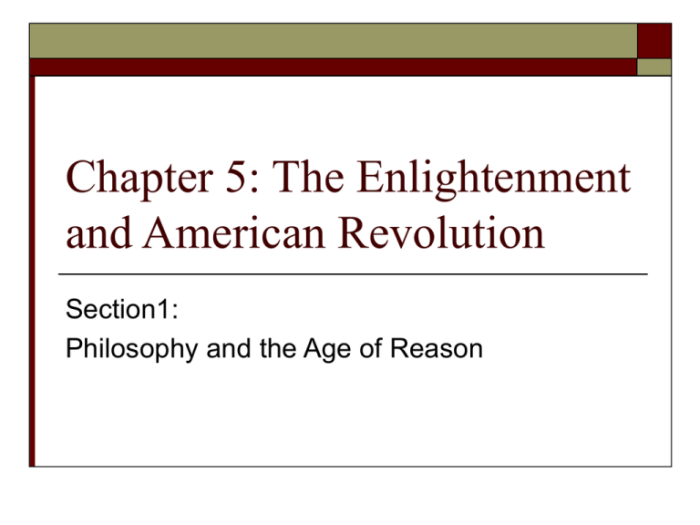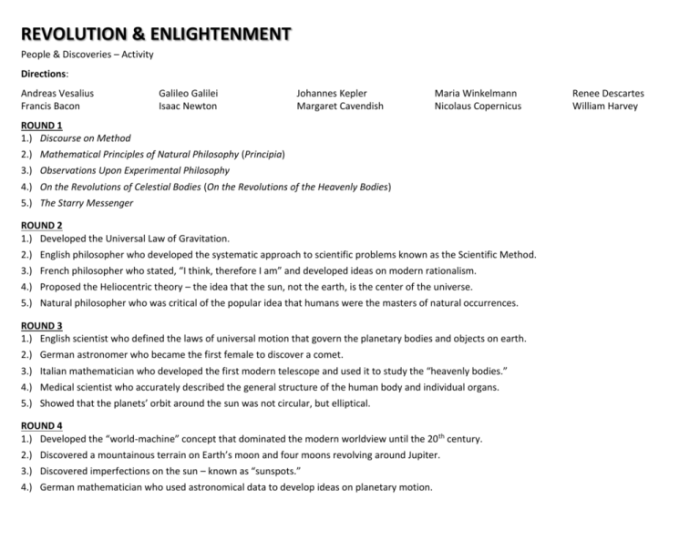Unit 10.2 enlightenment revolution and nationalism – Unit 10.2: Enlightenment Revolution and Nationalism embarks on a captivating exploration of a pivotal era that profoundly shaped the intellectual and political landscape of the modern world. This unit delves into the transformative ideas of the Enlightenment, the revolutionary fervor of the American and French Revolutions, and the rise of nationalism, tracing their profound impact on science, democracy, and the formation of nation-states.
As we embark on this intellectual journey, we will uncover the key concepts that ignited the Enlightenment, examining how they challenged traditional beliefs and fostered a spirit of rational inquiry. We will delve into the Scientific Revolution, exploring its pivotal role in shaping Enlightenment thought and revolutionizing our understanding of the natural world.
Enlightenment and the Scientific Revolution: Unit 10.2 Enlightenment Revolution And Nationalism

The Enlightenment, a philosophical and intellectual movement that originated in Europe during the 18th century, emphasized reason, individualism, and the importance of scientific inquiry. It was heavily influenced by the Scientific Revolution, which had led to groundbreaking discoveries in fields such as astronomy, physics, and biology.
Enlightenment thinkers believed that the scientific method could be applied to all aspects of human knowledge, including politics, society, and religion. This led to a shift away from traditional beliefs and practices and towards a more rational and empirical approach to understanding the world.
The Impact of the Scientific Revolution on Enlightenment Thought
The Scientific Revolution had a profound impact on Enlightenment thought by:
- Providing new methods for investigating the natural world, which challenged traditional beliefs and superstitions.
- Encouraging a spirit of skepticism and critical thinking, which led to a questioning of authority and the pursuit of knowledge through experimentation and observation.
- Expanding the scope of human knowledge, which led to new ideas about the universe, the human body, and the origins of life.
Enlightenment thinkers such as Isaac Newton, John Locke, and Voltaire were deeply influenced by the Scientific Revolution and used its principles to develop new theories and challenge existing norms.
Examples of How Enlightenment Ideas Influenced the Development of Science and Technology, Unit 10.2 enlightenment revolution and nationalism
Enlightenment ideas influenced the development of science and technology in several ways:
- The emphasis on reason and empirical evidence led to the development of new scientific instruments and techniques.
- The belief in progress and the perfectibility of human knowledge encouraged scientists to pursue new discoveries and inventions.
- The spread of Enlightenment ideas through print and education helped to create a more informed and scientifically literate public.
As a result, the Enlightenment played a major role in the advancement of science and technology during the 18th and 19th centuries.
The American Revolution

The American Revolution was a conflict between Great Britain and its thirteen colonies in North America that began in 1775 and resulted in the Declaration of Independence in 1776. The revolution was sparked by a series of political and economic grievances, including British taxation without representation, and it was influenced by Enlightenment ideas of self-determination and natural rights.
Causes of the American Revolution
The American Revolution was caused by a combination of factors, including:
- British taxation without representation, which violated the colonists’ belief in the principle of “no taxation without representation.”
- The British government’s attempts to control the colonies’ trade and economy, which stifled economic growth and led to resentment.
- The influence of Enlightenment ideas, which encouraged the colonists to question British authority and assert their own rights.
Key Events of the American Revolution
The key events of the American Revolution included:
- The Boston Tea Party (1773), a protest against British taxation that led to the passage of the Intolerable Acts.
- The Battle of Lexington and Concord (1775), which marked the beginning of the armed conflict between the colonists and the British.
- The Declaration of Independence (1776), which formally declared the colonies’ independence from Great Britain.
- The Battle of Yorktown (1781), which resulted in the surrender of the British army and the end of the war.
Impact of the American Revolution on the Development of Democracy
The American Revolution had a profound impact on the development of democracy around the world by:
- Establishing the United States as a new nation based on the principles of self-government and individual rights.
- Inspiring other revolutions around the world, including the French Revolution and the Haitian Revolution.
- Spreading Enlightenment ideas about democracy and human rights.
The American Revolution remains a significant event in the history of democracy and has served as a model for democratic movements around the world.
The French Revolution
The French Revolution was a period of radical social and political upheaval in France that began in 1789. It led to the overthrow of the monarchy, the establishment of a republic, and the spread of revolutionary ideas throughout Europe. The revolution was influenced by Enlightenment ideas of liberty, equality, and fraternity.
Causes of the French Revolution
The French Revolution was caused by a combination of factors, including:
- Economic inequality and widespread poverty, which led to social unrest and resentment against the aristocracy and the monarchy.
- Enlightenment ideas, which encouraged the people to question traditional authority and assert their own rights.
- The financial crisis of the French government, which was unable to pay its debts and resorted to raising taxes.
Key Events of the French Revolution
The key events of the French Revolution included:
- The Storming of the Bastille (1789), which marked the beginning of the revolution and the end of the monarchy.
- The Reign of Terror (1793-1794), a period of violence and executions that resulted in the deaths of thousands of people.
- The rise of Napoleon Bonaparte, who seized power in 1799 and established a new dictatorship.
Impact of the French Revolution on the Development of Nationalism
The French Revolution had a profound impact on the development of nationalism by:
- Creating a new sense of national identity among the French people, who had previously been divided by class and region.
- Inspiring other nationalist movements around the world, including the Italian and German revolutions.
- Spreading revolutionary ideas about the rights of nations to self-determination.
The French Revolution remains a significant event in the history of nationalism and has served as a model for nationalist movements around the world.
Nationalism and the Rise of Nation-States

Nationalism is a sense of pride and belonging to a nation, which is often accompanied by a desire for self-determination and independence. It emerged in Europe during the 19th century and led to the rise of nation-states, which are political entities based on national identity.
Factors that Contributed to the Rise of Nationalism
Several factors contributed to the rise of nationalism, including:
- The spread of Enlightenment ideas about self-determination and individual rights.
- The growth of industrialization and urbanization, which created new social and economic conditions.
- The influence of the French Revolution, which inspired people to fight for their national independence.
Examples of How Nationalism Influenced the Development of Nation-States
Nationalism influenced the development of nation-states in several ways:
- It inspired people to fight for their national independence, which led to the creation of new nation-states such as Italy, Germany, and Greece.
- It created a sense of national unity and identity, which helped to strengthen nation-states and promote economic and social development.
- It led to the development of national symbols, such as flags, anthems, and holidays, which helped to create a sense of national pride and belonging.
Nationalism remains a powerful force in the world today and continues to shape the development of nation-states.
The Impact of the Enlightenment and Nationalism on the Modern World

The Enlightenment and nationalism had a profound impact on the modern world by:
- Challenging traditional authority and promoting the principles of reason and individualism, which laid the foundation for modern democracy and human rights.
- Inspiring revolutions and movements for national independence, which led to the creation of new nation-states and the spread of democratic ideals.
- Creating a new sense of national identity and pride, which has shaped the development of modern societies and cultures.
The Enlightenment and nationalism continue to shape the world today, as they provide the intellectual and ideological foundations for many modern political systems and social movements.
FAQ Guide
What were the key ideas of the Enlightenment?
The Enlightenment emphasized reason, individualism, natural rights, and the pursuit of happiness, challenging traditional authority and superstition.
How did the Scientific Revolution influence Enlightenment thought?
The Scientific Revolution provided empirical evidence that challenged traditional beliefs, encouraging Enlightenment thinkers to question established norms and embrace a more rational approach to knowledge.
What was the impact of the American Revolution on democracy?
The American Revolution established the United States as a democratic republic, inspiring other nations to challenge monarchical rule and embrace popular sovereignty.
How did the French Revolution contribute to the rise of nationalism?
The French Revolution ignited a sense of national identity and unity among the French people, inspiring other European nations to develop their own nationalistic sentiments.
What is the legacy of the Enlightenment and nationalism in the modern world?
The Enlightenment’s emphasis on reason and individual rights continues to shape democratic societies, while nationalism remains a powerful force in shaping political identities and international relations.



